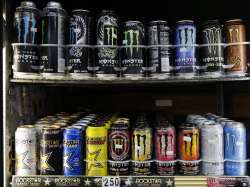Beware! Energy drinks can take a toll on your heart
Energy drinks are not recommended for use by people participating in sporting activities.

If you have ever thought that coffee is harmful to health, then you’ll be surprised to know that the energy drinks that are widely consumed by young people all over the world have dangerous side effects that a majority are unaware about.
Teenagers and adults who consume energy drinks may suffer from rapid heartbeat, nausea and seizures, warns a recent study.
According to the University of Waterloo in Ontario, Canada, over half of youth and young adults who consume an energy drink, have reported experiencing an adverse health event, including rapid heartbeat, nausea, and in rare cases, seizures.
Currently, Canadian legislation is meant to prohibit energy drinks from being marketed to children. Energy drinks are not recommended for use by people participating in sporting activities.
"Most risk assessments to date have used coffee as a reference for estimating the health effects of energy drinks; however, it is clear these products pose a greater health risk," said study author David Hammond.
"The health effects from energy could be due to the different ingredients than coffee, or the ways in which they consumed, including with alcohol or during physical activity; regardless, the findings suggest a need to increase surveillance of health effects from these products," Hammond added.
The team surveyed 2,055 young Canadians aged 12 to 24.
Of those that had reported consuming energy drinks at some point in their lives, 55.4 percent reported experiencing an adverse health event.
Of those reporting adverse health events, 24.7 percent reported experiencing a fast heartbeat, 24.1 percent reported difficulty sleeping and 18.3 percent reported experiencing headaches.
A total of 5.1 percent reported nausea, vomiting or diarrhoea, five percent sought medical attention, 3.6 percent reported experiencing chest pains and 0.2 percent reported having a seizure.
"The number of health effects observed in our study suggests that more should be done to restrict consumption among children and youth," Hammond stated.
(with ANI inputs)